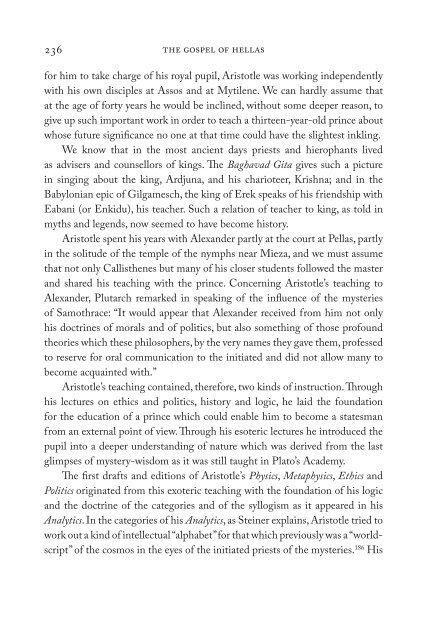The Gospel of Hellas - Research Institute for Waldorf Education
The Gospel of Hellas - Research Institute for Waldorf Education
The Gospel of Hellas - Research Institute for Waldorf Education
You also want an ePaper? Increase the reach of your titles
YUMPU automatically turns print PDFs into web optimized ePapers that Google loves.
the gospel <strong>of</strong> hellas<br />
<strong>for</strong> him to take charge <strong>of</strong> his royal pupil, Aristotle was working independently<br />
with his own disciples at Assos and at Mytilene. We can hardly assume that<br />
at the age <strong>of</strong> <strong>for</strong>ty years he would be inclined, without some deeper reason, to<br />
give up such important work in order to teach a thirteen-year-old prince about<br />
whose future significance no one at that time could have the slightest inkling.<br />
We know that in the most ancient days priests and hierophants lived<br />
as advisers and counsellors <strong>of</strong> kings. <strong>The</strong> Baghavad Gita gives such a picture<br />
in singing about the king, Ardjuna, and his charioteer, Krishna; and in the<br />
Babylonian epic <strong>of</strong> Gilgamesch, the king <strong>of</strong> Erek speaks <strong>of</strong> his friendship with<br />
Eabani (or Enkidu), his teacher. Such a relation <strong>of</strong> teacher to king, as told in<br />
myths and legends, now seemed to have become history.<br />
Aristotle spent his years with Alexander partly at the court at Pellas, partly<br />
in the solitude <strong>of</strong> the temple <strong>of</strong> the nymphs near Mieza, and we must assume<br />
that not only Callisthenes but many <strong>of</strong> his closer students followed the master<br />
and shared his teaching with the prince. Concerning Aristotle’s teaching to<br />
Alexander, Plutarch remarked in speaking <strong>of</strong> the influence <strong>of</strong> the mysteries<br />
<strong>of</strong> Samothrace: “It would appear that Alexander received from him not only<br />
his doctrines <strong>of</strong> morals and <strong>of</strong> politics, but also something <strong>of</strong> those pr<strong>of</strong>ound<br />
theories which these philosophers, by the very names they gave them, pr<strong>of</strong>essed<br />
to reserve <strong>for</strong> oral communication to the initiated and did not allow many to<br />
become acquainted with.”<br />
Aristotle’s teaching contained, there<strong>for</strong>e, two kinds <strong>of</strong> instruction. Through<br />
his lectures on ethics and politics, history and logic, he laid the foundation<br />
<strong>for</strong> the education <strong>of</strong> a prince which could enable him to become a statesman<br />
from an external point <strong>of</strong> view. Through his esoteric lectures he introduced the<br />
pupil into a deeper understanding <strong>of</strong> nature which was derived from the last<br />
glimpses <strong>of</strong> mystery-wisdom as it was still taught in Plato’s Academy.<br />
<strong>The</strong> first drafts and editions <strong>of</strong> Aristotle’s Physics, Metaphysics, Ethics and<br />
Politics originated from this exoteric teaching with the foundation <strong>of</strong> his logic<br />
and the doctrine <strong>of</strong> the categories and <strong>of</strong> the syllogism as it appeared in his<br />
Analytics. In the categories <strong>of</strong> his Analytics, as Steiner explains, Aristotle tried to<br />
work out a kind <strong>of</strong> intellectual “alphabet” <strong>for</strong> that which previously was a “worldscript”<br />
<strong>of</strong> the cosmos in the eyes <strong>of</strong> the initiated priests <strong>of</strong> the mysteries. 186 His

















